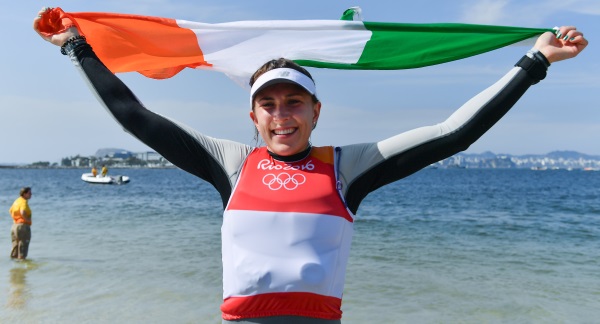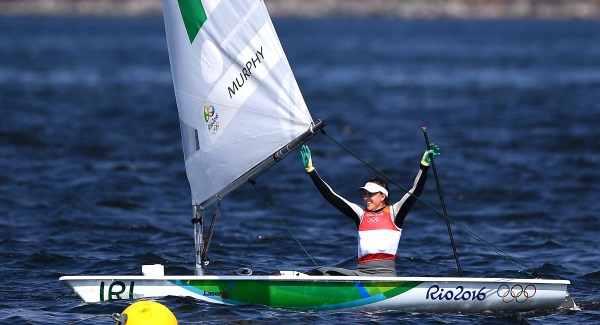There, it’s done! Annalise Murphy has at last claimed her Olympic medal that she has dedicated more than 10 years of her life to achieve, writes David Branigan for the Irish Examiner.
Her close call next to the podium in 2012 when she appeared certain to win a medal yet ended fourth can now be marked down to the learning process and the honing of her capabilities for a more rounded test of sailing skills that Rio’s conditions represented.
From her nickname of “The Lever” to what has emerged as an “all-rounder”, capable of winning a series based on consistent form rather than headline grabbing displays of raw boatspeed in one-sided weather conditions, Murphy has transitioned into a worthy Olympic medallist.
Over the past week, and apparently out of nowhere but certainly coming from a place of poor form over the past year, Murphy shot into gear from the outset of this Olympics.
But unlike London 2012, there were no runaway leads that made for thrilling TV but instead there was a careful, more measured approach that was more about consistently placing in the top five boats than achieving a race win occasionally with mostly mid-fleet placings.

Instead, she held Bronze, Silver and Gold standings with appropriate stickers and bibs at various stages over the five days of racing. Places were swapped with the London 2012 Gold medallist Lijia Xu from China, the Silver medallist Marit Boumeester from The Netherlands and Evi Van Acker, the Belgian bronze medallist.
Eventually, Xu would crash out of the competition but also in the hunt for the podium, the current world champion Sarah Young from Britain and her runner-up, American Paige Railey though in reality, both were out of contention even though they featured in the medal race final for the top 10 sailors in their 36-strong field.
All six girls plus Finland’s Tuula Tenkanen have sailed against one another since Youth level, a period of just over a decade in which Murphy started her international career, perhaps falteringly at first but rapidly gaining form over the past five years to her current standing.
Eleven years ago at the ISAF Youth World Championships in Korea, Railey, Xu and Young took Gold, Silver and Bronze.
A year later at the same event in Weymouth, Murphy placed 26th never finishing once inside the top ten. Boumeester, two years older than the Irish girl, in the same regatta took Silver.
The following year, Murphy won a race in the World Laser Radial Youth Championship in Holland to place tenth while Tenkanen took the title.

In New Zealand in 2008, Xu took Silver at Senior level while Tenkanen, Van Acker, Railey and Boumeester all featured in the top 20. Murphy barely featured in the Silver fleet.
Ironically, Andrea Brewster took the Bronze that year and a close friendship formed between her and Murphy that would eventually lead to an introduction to the Irish squad to see the Team GBR sailor paired with Saskia Tidey for Rio 2016 in the Women’s Skiff.
It wasn’t until 2009 that Murphy’s potential really started to show itself at the worlds in Karatsu, Japan. While Boumeester, Van Acker and Xu placed fourth, fifth and sixth, the younger Irish girl placed eighth.
Third overall in 2010 in the Under 21 placings and 19th overall saw Murphy poised for Senior level with just two years remaining in the run-in to London 2012 though her pathway really called for the 2016 games rather than launch too earlier into a massively demanding campaign.
But she went on to qualify Ireland for a place at the Olympics when she finished sixth in the windy venue of Fremantle, Western Australia in 2011.
It was the start of her highest profile phase when she featured ahead of or in close company with the athletes she would eventually battle with for podium places at the London and Rio Olympics.
Four years ago, having wowed the sailing world with a string of race wins in the breezy qualification round early stages, she was heading for the podium and Ireland first Olympic Sailing medal for more than three decades.
Famously, she went from Gold medal contender to fourth place in the space of ten minutes as she lacked downwind speed in the light to moderate breeze medal race final at Weymouth & Portland.
Although the gut-wrenching disappointment of that loss was somewhat offset by winning the European Championship in 2013 on Dublin at her home club, the National YC in Dun Laoghaire, if a repeat outcome was to be avoided in Rio, changes would be needed.
And so, for the next three years, Murphy metamorphosed from strength in heavier winds to become an all-rounder. It was a change that kept her in the top three places from the outset of the Rio Olympics all the way to the medal race final.
"I don't know whether I'm laughing or I'm crying." Annalise Murphy - silver medallist! https://t.co/JHLN2WPhL4 https://t.co/ML5ecw1489
— RTÉ Sport (@RTEsport) August 16, 2016
Doubts were expressed, publicly and privately in the lead-up to the games that she would perform in Rio’s notoriously fickle conditions. She even acknowledged her poor run of recent form herself. Bookies offered odds of 100/1 for Murphy to medal.
In fact, all her hard work of losing weight to improve her light airs performance and nine trips to the Brazilian venue to train and compete in pre-Olympic events had quietly come together, peaking perfectly at the games and catching everyone off-guard.


